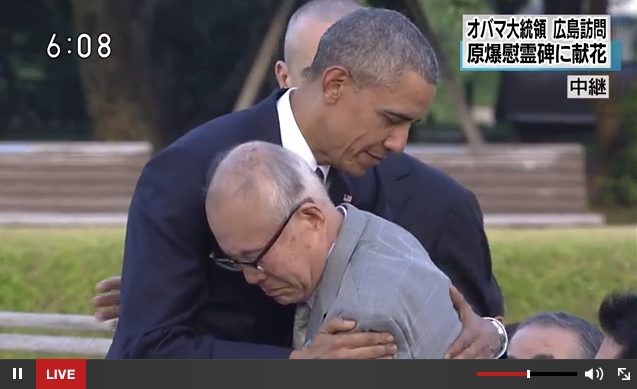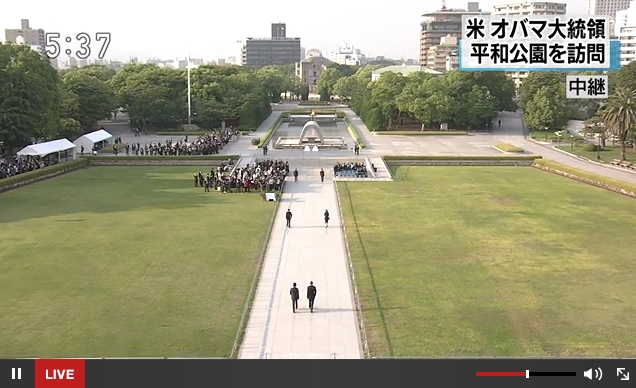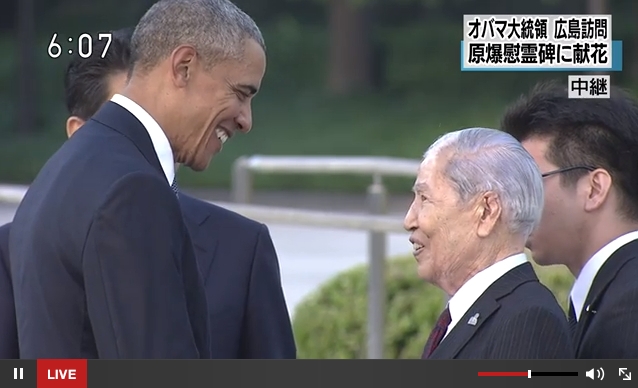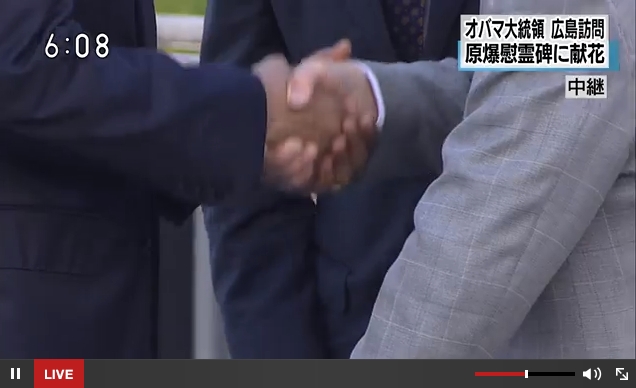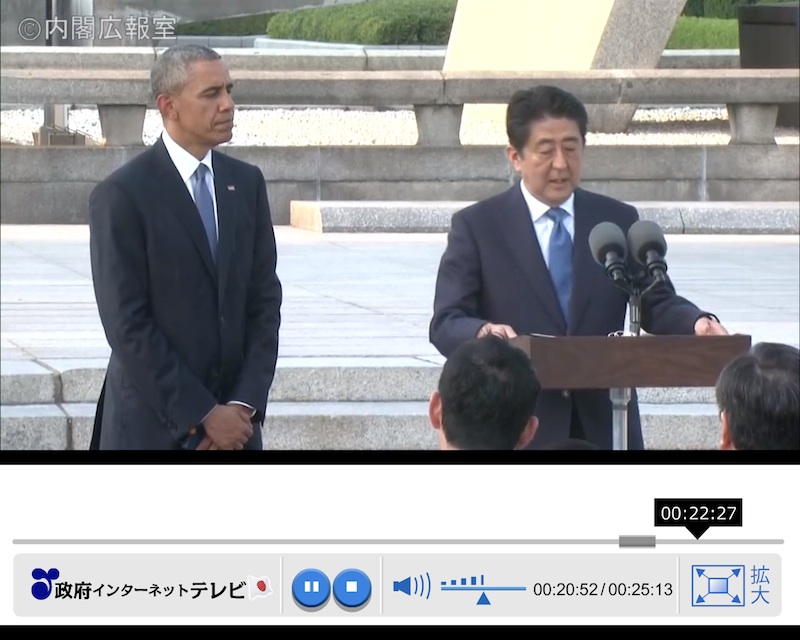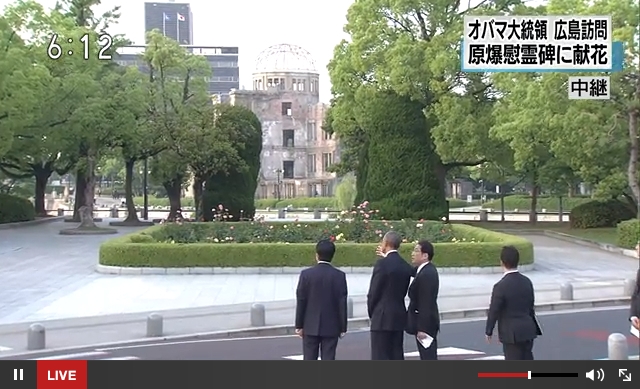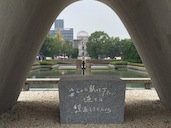「過ちは繰返しませぬから」という言葉が刻まれた原爆死没者慰霊碑の前で、アメリカのオバマ大統領が行ったスピーチ。「過ち」が何であるのか、「繰返さない」未来がどんなものなのかが語られていた。
バラク・オバマ氏はアメリカ大統領に就任した2009年、チェコの首都プラハで、唯一核兵器を戦争で使用した核大国であるアメリカには「核なき世界」実現のための責任があると演説している。しかし、翌年に核実験を実施するなど、核政策に対する姿勢には疑問の声もあった。
ヒロシマでのスピーチについては、具体性がない、理想論に終始した、事前のスピーチ原稿そのままだったなど批判の声もあるが、原爆を投下した国の大統領が被爆地を訪れたことの意義は大きい。
以下、アメリカのホワイトハウスのWebページから、スピーチ全文を引用する。
71年前、雲のない晴れ渡った空から死が訪れ、世界が一変しました
Remarks by President Obama and Prime Minister Abe of Japan at Hiroshima Peace Memorial
Hiroshima Peace Memorial
Hiroshima, Japan
5:45 P.M. JST
PRESIDENT OBAMA: Seventy-one years ago, on a bright, cloudless morning, death fell from the sky and the world was changed. A flash of light and a wall of fire destroyed a city and demonstrated that mankind possessed the means to destroy itself.
Why do we come to this place, to Hiroshima? We come to ponder a terrible force unleashed in a not so distant past. We come to mourn the dead, including over 100,000 in Japanese men, women and children; thousands of Koreans; a dozen Americans held prisoner. Their souls speak to us. They ask us to look inward, to take stock of who we are and what we might become.
It is not the fact of war that sets Hiroshima apart. Artifacts tell us that violent conflict appeared with the very first man. Our early ancestors, having learned to make blades from flint and spears from wood, used these tools not just for hunting, but against their own kind. On every continent, the history of civilization is filled with war, whether driven by scarcity of grain or hunger for gold; compelled by nationalist fervor or religious zeal. Empires have risen and fallen. Peoples have been subjugated and liberated. And at each juncture, innocents have suffered, a countless toll, their names forgotten by time.
私たちの思考が、想像力が、言語が、技術が、(人類を人類たらしめる)能力が、同時に比類なき破壊の力を与えるのです
The World War that reached its brutal end in Hiroshima and Nagasaki was fought among the wealthiest and most powerful of nations. Their civilizations had given the world great cities and magnificent art. Their thinkers had advanced ideas of justice and harmony and truth. And yet, the war grew out of the same base instinct for domination or conquest that had caused conflicts among the simplest tribes; an old pattern amplified by new capabilities and without new constraints. In the span of a few years, some 60 million people would die -- men, women, children no different than us, shot, beaten, marched, bombed, jailed, starved, gassed to death.
There are many sites around the world that chronicle this war -- memorials that tell stories of courage and heroism; graves and empty camps that echo of unspeakable depravity. Yet in the image of a mushroom cloud that rose into these skies, we are most starkly reminded of humanity’s core contradiction; how the very spark that marks us as a species -- our thoughts, our imagination, our language, our tool-making, our ability to set ourselves apart from nature and bend it to our will -- those very things also give us the capacity for unmatched destruction.
同じ物語がいかに頻繁に、異なる人々を圧迫し、人間性を奪うために使われてきたことでしょうか
How often does material advancement or social innovation blind us to this truth. How easily we learn to justify violence in the name of some higher cause. Every great religion promises a pathway to love and peace and righteousness, and yet no religion has been spared from believers who have claimed their faith as a license to kill. Nations arise, telling a story that binds people together in sacrifice and cooperation, allowing for remarkable feats, but those same stories have so often been used to oppress and dehumanize those who are different.
人類社会の進展を伴わない技術の進歩は、私たちに破滅をもたらしうるのです
Science allows us to communicate across the seas and fly above the clouds; to cure disease and understand the cosmos. But those same discoveries can be turned into ever-more efficient killing machines.
The wars of the modern age teach this truth. Hiroshima teaches this truth. Technological progress without an equivalent progress in human institutions can doom us. The scientific revolution that led to the splitting of an atom requires a moral revolution, as well.
これが私たちがこの場所に来た理由です
That is why we come to this place. We stand here, in the middle of this city, and force ourselves to imagine the moment the bomb fell. We force ourselves to feel the dread of children confused by what they see. We listen to a silent cry. We remember all the innocents killed across the arc of that terrible war, and the wars that came before, and the wars that would follow.
And since that fateful day, we have made choices that give us hope. The United States and Japan forged not only an alliance, but a friendship that has won far more for our people than we could ever claim through war. The nations of Europe built a Union that replaced battlefields with bonds of commerce and democracy. Oppressed peoples and nations won liberation. An international community established institutions and treaties that worked to avoid war and aspire to restrict and roll back, and ultimately eliminate the existence of nuclear weapons.
国家には自衛の手段が必要です。しかし私たちは恐怖のロジックから逃れ出る勇気を持たねばならず、核兵器のない世界を追求しなければならないのです
Still, every act of aggression between nations; every act of terror and corruption and cruelty and oppression that we see around the world shows our work is never done. We may not be able to eliminate man’s capacity to do evil, so nations –- and the alliances that we’ve formed -– must possess the means to defend ourselves. But among those nations like my own that hold nuclear stockpiles, we must have the courage to escape the logic of fear, and pursue a world without them.
私が生きている間には実現しないかもしれません。しかし…
We may not realize this goal in my lifetime. But persistent effort can roll back the possibility of catastrophe. We can chart a course that leads to the destruction of these stockpiles. We can stop the spread to new nations, and secure deadly materials from fanatics.
ライフルや粗末な爆発物でさえ、恐ろしい規模の暴力を引き起こすのです
And yet that is not enough. For we see around the world today how even the crudest rifles and barrel bombs can serve up violence on a terrible scale. We must change our mindset about war itself –- to prevent conflict through diplomacy, and strive to end conflicts after they’ve begun; to see our growing interdependence as a cause for peaceful cooperation and not violent competition; to define our nations not by our capacity to destroy, but by what we build.
人類は過去の過ちを繰り返すように遺伝子に規定されてはいません
And perhaps above all, we must reimagine our connection to one another as members of one human race. For this, too, is what makes our species unique. We’re not bound by genetic code to repeat the mistakes of the past. We can learn. We can choose. We can tell our children a different story –- one that describes a common humanity; one that makes war less likely and cruelty less easily accepted.
その物語は「被爆者」に見いだすことができます。原爆を投下したパイロットを許した女性、ヒロシマで亡くなったアメリカ人を捜し出した男性…
We see these stories in the hibakusha –- the woman who forgave a pilot who flew the plane that dropped the atomic bomb, because she recognized that what she really hated was war itself; the man who sought out families of Americans killed here, because he believed their loss was equal to his own.
That is the story that we all must tell
My own nation’s story began with simple words: All men are created equal, and endowed by our Creator with certain unalienable rights, including life, liberty and the pursuit of happiness. Realizing that ideal has never been easy, even within our own borders, even among our own citizens.
But staying true to that story is worth the effort. It is an ideal to be strived for; an ideal that extends across continents, and across oceans. The irreducible worth of every person, the insistence that every life is precious; the radical and necessary notion that we are part of a single human family -– that is the story that we all must tell.
ヒロシマ、そしてナガサキが核戦争の幕開けとしてではなく、私たち自身のモラルの目覚めとして知られる未来を
That is why we come to Hiroshima. So that we might think of people we love -- the first smile from our children in the morning; the gentle touch from a spouse over the kitchen table; the comforting embrace of a parent –- we can think of those things and know that those same precious moments took place here seventy-one years ago. Those who died -– they are like us. Ordinary people understand this, I think. They do not want more war. They would rather that the wonders of science be focused on improving life, and not eliminating it.
When the choices made by nations, when the choices made by leaders reflect this simple wisdom, then the lesson of Hiroshima is done.
The world was forever changed here. But today, the children of this city will go through their day in peace. What a precious thing that is. It is worth protecting, and then extending to every child. That is the future we can choose -– a future in which Hiroshima and Nagasaki are known not as the dawn of atomic warfare, but as the start of our own moral awakening. (Applause.)
核兵器使用国の大統領が71年の時を経てようやく被爆地を訪れた。このことが「ヒロシマからの道」の大きな一歩となることをねがう。
安倍総理:日本と米国が、力を合わせて、世界の人々に「希望を生み出す灯」となる
オバマ大統領に続いて行われた安倍総理のスピーチは、内閣府のWebページに掲載されている。またこのページでは、両首脳のスピーチの動画を見ることもできる。
※ オバマ大統領のスピーチの翻訳はアフレコなのか、テレビでの同時通訳よりも整理されていてわかりやすい。
リンク
最終更新:
